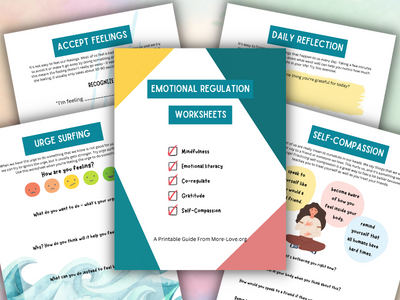
If you have a teenager with an eating disorder, then you’re probably on an emotional roller coaster. Your child is biologically programmed to separate from you during this time, to test boundaries and develop their own way of operating in the world. So what can you do when they’re driving you crazy and you have a million other things on your plate? There is no easy answer, but here are some things to keep in mind.
One Minute at a Time
Teenagers with eating disorders often also have challenges with anxiety and depression. They experience massive mood swings that can sweep through your house like a massive tornado.
Your teen may tantrum, scream, and cry unconsolably. Of course you want them to stop. Every single cell in your body wants them to stop. At first, you may want them to stop for her sake – she’s working herself into a frenzy! But then, you probably want her to stop for your sake – Jeez! What is WRONG with her! Why is she making all this noise! It’s so upsetting!
Emotional Regulation Worksheets
Give these printable worksheets to grow more confident, calm and resilient and feel better, fast!
- Self-Esteem
- Self-Regulation
- Mindfulness
- Calming strategies
It’s OK for you to feel that and more while your teen is emotionally out of control. The best thing you can do is stay in the moment and manage your own emotions. But that doesn’t mean you have to be some sort of zen master. All you have to do is make it through one minute at a time. Don’t think ahead, don’t think back. Don’t worry about what is “proper” or what she “should” be doing. Just breathe and be there. Take your teen’s tantrum one minute at a time, and you can handle it. Promise.
Acceptance of What IS
So much of parenting feels like we should be guiding and making things better for our children. But when adolescence hits, it can seem like everything that has worked previously stops working – and in some ways, it has. You need to learn how to handle the growing adult who lives in your house, not try to hold onto the little child they once were.
Your teen is growing up and growing away from you. They will push you away. They will lie to you. They will do things that make no sense. This is all part of being a teenager.
The main difference is that most of us haven’t raised our kids under the “command and control” model of parenting. We didn’t spank or shame or tell them that children should be seen and not heard. Now, as a reward for not being controlling, our teens are not afraid of us. That means we literally have less control. Parenting has changed. Let go of any fantasies about controlling your child the way your parents controlled (or tried to control) you, and find ways to work with your teen in the new parenting paradigm.
Know When to Stop Talking
There is a difference between being supportive and being sucked into a nasty vortex of anxiety. When your teenager is raging, you want to support their feelings and let them happen, so you try to talk them through rationally. But the more you try to talk, the bigger the storm becomes, which is bewildering and frustrating, too.
Sometimes in our culture we are overly dependent on language. We think that if we can explain something, it will go away. That lassoing the exact feeling with words will get it under control.
But sometimes the opposite is true. Sometimes feelings just can’t – and and don’t need to – be put into words. Your teenager with an eating disorder is processing feelings inside their body, not inside their mind. So sometimes you need to reach out to your teen on the level of the body, not the mind.
Sometimes you need to just hold your teen, saying nothing. Physical affection can feel awkward as your teen develops, but never underestimate the power of holding your child close, patting their back, and making soothing noises. Remember how you did that when they was very little? That is what their inner child still craves. Your teen still needs that from you, even if they act uncomfortable at first. Try reaching them on a physical level gradually at first, and then more often as they begins to trust the experience of being physically comforted by you.
Most of all, love yourself through this process. You are doing the best that you can!

Ginny Jones is the founder of More-Love.org, and a Parent Coach who helps parents who have kids with disordered eating and eating disorders. Combining science, compassion, and experience coaching hundreds of families, she helps parents understand what’s going on with their kids’ eating behaviors and teaches them the science-backed skills to heal kids’ relationship with food, improve their body image, and feel better about themselves, their relationships, and life in general.
Ginny has been researching and writing about eating disorders since 2016. She incorporates the principles of neurobiology and attachment parenting with a non-diet, Health At Every Size® approach to health and recovery.


